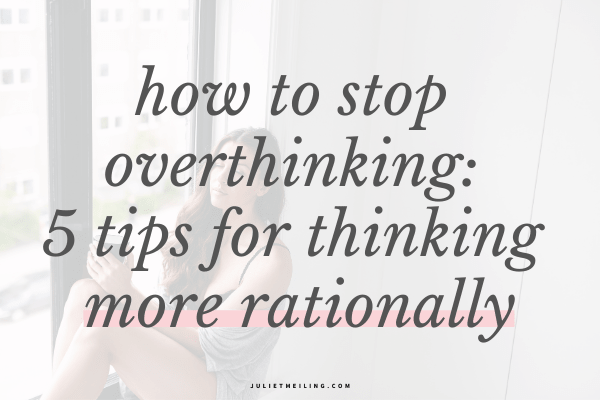How to Stop Overthinking: 5 Tips to Think More Rationally
Want to stop overthinking everything? Learn how to stop overthinking and think more rationally.
Being an overthinker is a double-edged sword. It makes you a better planner and you may feel more in control, but it can also make you more cautious and insecure about your future plans and actions.
Getting into the habit of overthinking can complicate your life and make it difficult for you to enjoy everyday things like talking to a friend, inviting a family member out to lunch, or doing activities that get you out of your comfort zone.
I thoroughly understand what it is like to be an overthinker and how being an overthinker can turn your life into a constant game of “what if.”
In college, I was diagnosed with depression, anxiety, and adjustment disorder.
These diagnoses plagued me and made it very difficult for me to enjoy my junior and senior years of college. But with counseling and medication, I was able to gain control of my overthinking, wean myself off of my antidepressant, and live a more fulfilling life.
In today’s blog post I will be sharing with you 5 tips to help you stop overthinking and start thinking more rationally.
Before we get started, though, a quick disclaimer: I am not a licensed medical or mental health professional. I cannot diagnose you or treat you medically.
If you are in need of medical help or help with suicidal thoughts, thoughts of self-harm, or simply need someone to talk to please seek out help from a local medical or mental health professional.
You can also call the National Suicide Prevention Hotline at 1-800-273-8255 or chat online with someone at https://suicidepreventionlifeline.org/.
- Want to stop overthinking everything? Learn how to stop overthinking and think more rationally.
- Tip #1: Learn, understand, and identify the different types of irrational thoughts you are having
- Tip #2: Limit yourself for how long you will let your thoughts escalate
- Tip #3: Fact check your thoughts
- Tip #4: Recognize that everyone cares more about themselves
- Tip #5: Seek counseling as needed
- Concluding thoughts on how to stop overthinking and start thinking more rationally
- Thanks for reading about how to start thinking more rationally.

*This post may contain affiliate links. Purchasing a product or service through an affiliate will earn me a small commission at no additional cost to you. Please read our Disclaimer Policy for more information about the use of affiliate links on this site.
Tip #1: Learn, understand, and identify the different types of irrational thoughts you are having
By nature, as an overthinker, you have A LOT of thoughts running through your mind.
And unfortunately, not all the thoughts you have are positive.
The negative thoughts can be especially hard to control when you are alone and no one is there to pull you away from your mind.
One way to control your overthinking is to learn, understand, and identify the different types of thoughts you are having.
Negative or irrational thoughts are actually called cognitive distortions. And don’t worry, having cognitive distortions doesn’t make you abnormal.
In fact, we all have cognitive distortions and it’s just part of our everyday life. However, when your cognitive distortions get out of control, it is time to take a step back and analyze your thoughts.
When I was in psychological counseling in college, my counselor provided me with this really cool document listing the different types of irrational thoughts or cognitive distortions. And we’re going to go through all of them now.
Magnification and minimization
This type of cognitive distortion is when you believe that your failures are more important than anyone else’s (magnification) or that your achievements are not good enough (minimization).
For example, you get a 98 on an exam, but you feel like it is not a high enough grade compared to the person sitting next to you who got a 100.
Another example would be: you believe that the error you made during a presentation at work was the WORST thing that could have ever happened even though your co-workers also had their share of mistakes.
In addition to magnification and minimization, these types of thoughts can lead to catastrophizing. Which is when your single thought escalates to thinking about worst case scenarios.
Going back to our original examples: you are upset about making a 98 on a test because someone next to you got a 100 and now you are thinking that you won’t make it into graduate school and you’ll end up homeless after graduating.
Or, because you made an error during a work presentation, you believe you will be fired from your job, then your family will disown you, and you will become homeless.
Magnification and minimization can make it difficult to get out of a constant loop of negativity. But acknowledging that you have thoughts that fit this type of cognitive distortion can help you stop overthinking.
By being able to identify when you are having a magnification and or minimization thought you are able to stop, pause, and ignore or push the thought away.
Overgeneralization
When you overgeneralize you simply put a black and white label on your actions. As a result, you end up believing that you are only one way or the other and the world sees you as such even though that is not true!
For example, you go out on a date and you are not very talkative, and when you do talk you are a nervous wreck! When you finish up the date and you’re driving home you think to yourself, “wow, I was so awkward… everyone must think I am awkward.”
But that is simply not true! You are not and cannot be just awkward or not awkward. Being what you define as awkward is situational and maybe you weren’t 100% comfortable with the person you went out on a date with.
However, overgeneralization can make it difficult for you to see yourself and your actions on a case-by-case basis.
Magical Thinking
This type of cognitive distortion is when you believe a specific action will result in a specific result.
For example, you knock on wood to prevent something bad from happening. Or, you do a complex ritual before an interview because you believe it will get you a job offer at your upcoming job interview.
In more extreme cases, perhaps you believe that because you yelled at your boyfriend this morning, that resulted in him getting to a car accident–when in reality those two separate events did not cause one another to occur. It was just bad luck.
Magical thinking can prevent you from living your life to the fullest. It can make you fall into compulsive behaviors that prevent you from enjoying life or lead to crippling anxiety.
Personalization
Have you ever been told you take things way too personally? Yeah, me too!
And as overthinkers, we also tend to be overly helpful and cautious about how we approach interactions with others.
When your thoughts are under the personalization category, you believe that the reason why someone is feeling a certain way is because you aren’t doing enough for them.
For example, you believe your best friend is angry all the time because you aren’t being a good enough friend.
In reality, though, your best friend may have other things going on in her life that are making her angry and have nothing to do with who you are as a friend: maybe she broke up with her boyfriend or just got fired from a job.
You may be a wonderful friend to her and supportive, but simply being a friend to her is not relieving her of everything. For her to find relief, she has to resolve things in her personal life. And you have no control over that, and that’s ok!
When it comes to thoughts that are personalized, you have to learn to let go and be ok with not being in control.
There are a lot of things in this world that we have no control over. But if you try to resume control over everything, you’ll end up mentally and emotionally exhausted.
Jumping to conclusions
It is natural for you to want closure, especially for an event that was negative or toxic. Sometimes the easiest thing to do is come up with your own interpretation of the situation and why it happened the way it did regardless if it is true or false.
However, without all the facts to guide you, you can get overworked about a situation that may not be as upsetting if you simply had all the facts.
When you and your thoughts jump to conclusions you are making up reasons for why something happened, why someone acted the way they did, why you acted the way you did, etc. without all the facts.
We tend to jump to conclusions rather than reach out and ask the tough questions because it is simply easier, but also not always the healthiest.
For example, you and your friend get into an argument.
After the argument you reflect on why the argument started in the first place and think: I must have said something wrong and that led to us getting into an argument. And then you beat yourself up and start over analyzing your previous interactions with your friend and the dialogue you two had.
However, in reality, maybe your friend just got a bad test grade or cut off by someone while driving and she was projecting her feelings onto you.
But instead of going to your friend and discussing the argument, you are overthinking the entire situation.
There are two ways you and your thoughts may be jumping to conclusions: mind reading and fortune telling.
When you are mind reading you are making things up about how someone feels about you or how their behaviors reflect on how they feel about you without any evidence.
For example, in college I had a love/hate relationship with having conversations with friends. I would love the opportunity to hang out with my friends, but I always had this circling thought of, “they must think I’m boring.”
Which was simply NOT TRUE. Why was this not true?
Because my friends never explicitly said, “you’re boring, Juliet.”
And so without evidence, I was just irrationally thinking about the entire situation.
My thoughts ultimately took up so much of my energy that I had a difficult time building strong relationships with my friends.
Fortune telling is when you just assume a certain event or situation will be bad without evidence.
This type of jumping to conclusions can be difficult to reverse if you have had a similar occurrence turn out poorly in the past.
For example, one night you go to a party and you feel so left out and leave disappointed. The next time you are invited to a party you automatically jump to the conclusion that this upcoming party will turn out the same way as the last party you went to, which may or may not be the truth.
With fortune-telling, for you to reverse the irrational thought, requires you to endure the experience to get the evidence that, for example, not all parties will result in you being left out.
However, it is hard to muster up the energy to do something or attend something you have had a negative experience with in the past. So you often end up avoiding the situation altogether.
Emotional reasoning
When you are emotionally reasoning you are taking a feeling and making the assumption that you are that way in every situation. For example, you get a bad quarterly review from your boss and you feel like a bad employee.
You then think, “I must be a bad employee then,” and then you quit your job or put in even less effort at work.
But in reality, you are not a bad employee at all–maybe there was a family emergency that occurred that took away energy from your work. Or you simply just didn’t have the best quarter, but there is room for improvement for the next quarterly review!
Disqualifying the positive
If you are a perfectionist like I am, it can be hard to get away from only noticing the negatives even when there are a millions different positives that outweigh the negatives.
When you disqualify the positive you seek out and hone in on the negative aspects only. Even one negative remark makes you crumble mentally.
“Should” statements
It can be difficult seeing other people you know on social media or your friends and family appear to be thriving in life when you simply feel stuck or negative about your current circumstances.
During those moments of uncertainty or feelings of insecurity about your life, it is easy to think in “should” statements.
For example, “I should be happy all the time” or “I should be further ahead than where I am now.”
This type of thinking and mindset is toxic because you lose appreciation for what you have and disregard all the progress you have made as an individual.
As an important reminder, always remember that social media is a highlight reel. People are not always happy, everyone has bad days, and everyone has similar doubts about the direction their life is going in compared to those around them.
All-or-nothing thinking
Living in a black and white world is often how overthinkers operate. When in reality, the world operates on a spectrum where nothing is truly one way or the other.
However, it is difficult to recognize this and reprogram our thoughts.
When you have all-or-nothing thoughts you often think in terms of “always,” “never,” or “every.” For example, “I should always be productive” or “I’ll never be good at this.”
All-or-nothing thinking is harmful to your potential because you are capable of being good at something with practice and patience. And you don’t always have to be productive either–rest is actually a good thing too!
Tip #2: Limit yourself for how long you will let your thoughts escalate
One of the best ways to stop overthinking is to give yourself a time limit on how long you allow yourself to overthink.
For example, you limit yourself for 5 minutes to think about all the different possibilities, good or bad, about a bad test grade you got. After 5 minutes you stop thinking about it and move on with your life.
It’s a lot easier said than done of course, but if you make it an intentional habit to start incorporating you’ll eventually become a master of identifying when you’re overthinking and setting up a boundary for yourself in regards to how long you can think about it.
Sometimes when I am in the car or all by myself I catch my thoughts going in a million different directions.
I end up overthinking conversations I had previously had or how the future will be. When I catch myself overthinking, I let myself have the thoughts for a few minutes, then I switch my thoughts off, and refocus my attention on my music or the podcast I was listening to.
Tip #3: Fact check your thoughts
A lot of the time we develop the habit of overthinking because we are trying to work through an event or situation that we never got closure on.
Let’s say you had a nasty breakup with your significant other and there was no true reason why they broke up with you.
Devastated you start musing in your mind about all the different reasons why the relationship ended:
- Was I not attractive enough?
- Was I not good enough?
- Was it something I said?
- Were they cheating on me?
- Am I a bad person?
- Is this how other people see me too?
- Was this relationship a lie the whole time?
- What was the point of all of this?
- Etc.
Your desire to have closure mixed with the lack of obtaining closure only breeds more overthinking, more self-doubt, self-loathing, and more.
To get out of this vicious cycle you need to accept the fact that in these types of situations closure is simply not going to happen.
And you can’t assume that you were in the wrong or a bad significant other until the facts are presented to you.
Think about it as a legal trial.
Someone is assumed not guilty until proven otherwise. The same can apply to you– you are not “x” until proven otherwise.
For example, you are not a bad girlfriend until someone explicitly says with words or in writing that you are a bad girlfriend. Or, you are not a bad coworker until your boss or another coworker comes over and tells you that.
Until you get the facts, you need to go back to tip #2 (limiting how long you can overthink) and then move on with your life.
Of course you are allowed to grieve the end of a relationship, a bad situation at work, at home, or at school, but don’t beat yourself up about things you have no control over and have no factual evidence to back up your irrational thoughts.
If and when you do have the evidence that you were a bad girlfriend, a bad coworker, etc. then you can take action to better yourself for the future. But until then, keep doing what you are doing and work on improving yourself on your own terms.
Tip #4: Recognize that everyone cares more about themselves
When I was in college I would get so caught up in this thought that everyone thought that I was boring.
But in reality, no one told me to my face that I was boring. I just made the assumption that I was boring and it really took away from my potential to form friendships.
Just like I cared so much about what others thought about me, people are also hardcore into themselves and thinking about how others see them.
It is a wake-up call once you recognize that everyone cares more about themselves than you. But acknowledging this fact can help you stop overthinking things and be more willing to be yourself when interacting with others.
Tip #5: Seek counseling as needed
Overthinking, when it becomes out of control, can be disabling.
You may start to not enjoy being around other people because of all the fears you have about how people will think about you or develop the fear that you are bothering others.
You may start having low self-worth or confidence. And you may also feel trapped in your thoughts and controlled by your thoughts.
When your habit of overthinking stops you from doing things you enjoy and start retrieving heavily into yourself, it may be time to seek professional help.
Talking to a counselor can help you recognize how you think and process the world. A counselor can also help you develop the necessary coping skills to help you fight back against your toxic mind and help you start living life on your own terms again.
Seeking the help of a counselor does not mean you are not strong enough.
It actually means you have recognized the seriousness of your overthinking and want to get better. And coming to terms with your weaknesses or bad habits takes a lot of courage and strength.
If you are in college or university, you can usually find free psychological services on campus since you’re most likely already paying a fee at the beginning of the semester for these services regardless if you are utilizing them or not.
If you are not in college or university try talking with your insurance provider about psychological or mental health professionals in your area who accept your insurance.
Alternatively, you can do a quick Google search for mental health counseling services near you and see if they accept your insurance or have self-pay options if you do not have insurance and are accepting new patients at their practice.
Try not to get discouraged though if the practice is not accepting new patients at this time. Just keep on trying and being an advocate for your mental health.
And again, if you are experiencing thoughts of self-harm or suicide or have the plans or intentions to self-harm or committing suicide please call the National Suicide Prevention Hotline at 1-800-273-8255 or dial your local emergency number (911 in the USA).
Concluding thoughts on how to stop overthinking and start thinking more rationally
Overthinking can be difficult to overcome.
The habit of overthinking starts off so small and overtime can escalate to becoming a full-time job controlling your thoughts.
In today’s blog post I shared with you 5 tips to help you stop overthinking and start thinking more rationally.
In summary:
- Learn, understand, and identify the different types of thoughts or cognitive distortions you have
- Give yourself a time limit for how long you can let your mind wander and then move on
- Fact check your thoughts
- Recognize that everyone cares more about themselves than you
- Seek the help of a mental health professional or psychologist as needed
I hope today’s blog post has been insightful and helpful as you learn how to regain control over your thoughts, and thus, your life!






